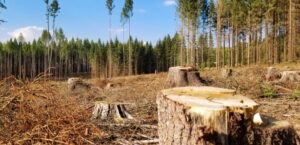by The Cowl Editor on November 14, 2019
Opinion

by Peter Mazzella ’22
News Staff
With record high heat waves this summer, there is only one group to blame: ourselves. Every year over 36 million trees are lost due to expansion and urbanization, and this could have some pretty serious side effects. If we continue to take our trees for granted “cities will become warmer, more polluted and generally more unhealthy for inhabitants,” said David Nowak, a senior US Forest Service scientist.
A continual loss of trees could mean an increase in temperature up to 10 degrees. This may not seem like too bad of a trade off, however, this seemingly small change could have drastic repurcussions on the environment and our future.
We could see a large decrease in universal water quality, and ice glaciers will likely melt, causing floods all over the world, which would be compounded by the fact that there would be less trees to absorb the flood water.
It may not seem like we are losing enough trees to make a noticeable difference, however, the lost value of the trees being cut down per year are around $96 million. So what? When a set of trees are cut down to build a new road or building, it not only affects the new site, but also the surrounding region.
Trees are also helpful in the absorption of greenhouse gases that can potentially be harmful in our lifetime. With only half of trees remaining, this danger becomes more and more of a concern.
15.3 billion trees are estimated to be cut down every year, and the numbers are increasing as deforestation continues to be a large problem. The earth has about 3.04 trillion trees, although that number is vastly declining each year.
Although it would take a considerable amount of time for every tree to be cut down, far longer than our perceived lifespans, it does not mean we should not be active about conserving our trees.
If trees were cut down to a level where they become scarce, this would have overwhelming effects on the state of the earth. Land would dry out, which would cause forest fires and damage the remaining animal populations in those areas.
The numbers may seem grim, but that does not mean that we should stand idly by as our forests become obsolete. A small island off the coast of Tanzania called Kokota is combating climate change and taking matters into their own hands. In the past decade, this small island has planted over two million trees to repair the damages done to their land. There are ways that we all can help to sustain our forests and keep the air clean.
Organizations like One Tree Planted and The Nature Conservancy take donations to plant trees to replenish the forests lost due to wildfires and deforestation. One Tree Planted is hosting a fundraiser for the recent wildfires in California, where a $1 donation will plant one tree. The Nature Conservancy has a goal of planting one billion trees, through donations and hands-on work.
If we want to sustain our clean air and protect our forests, the first step is demanding action. By contributing to nonprofit organizations with the intention of restoring forests, the impact of one donation could be immense. Multiply that by a population, and the results could be life changing for generations to come. Informing the general public is the first step to change. One tree could be a catalyst for many others to come, which can alleviate some of the stress that we have put on the earth in recent years.